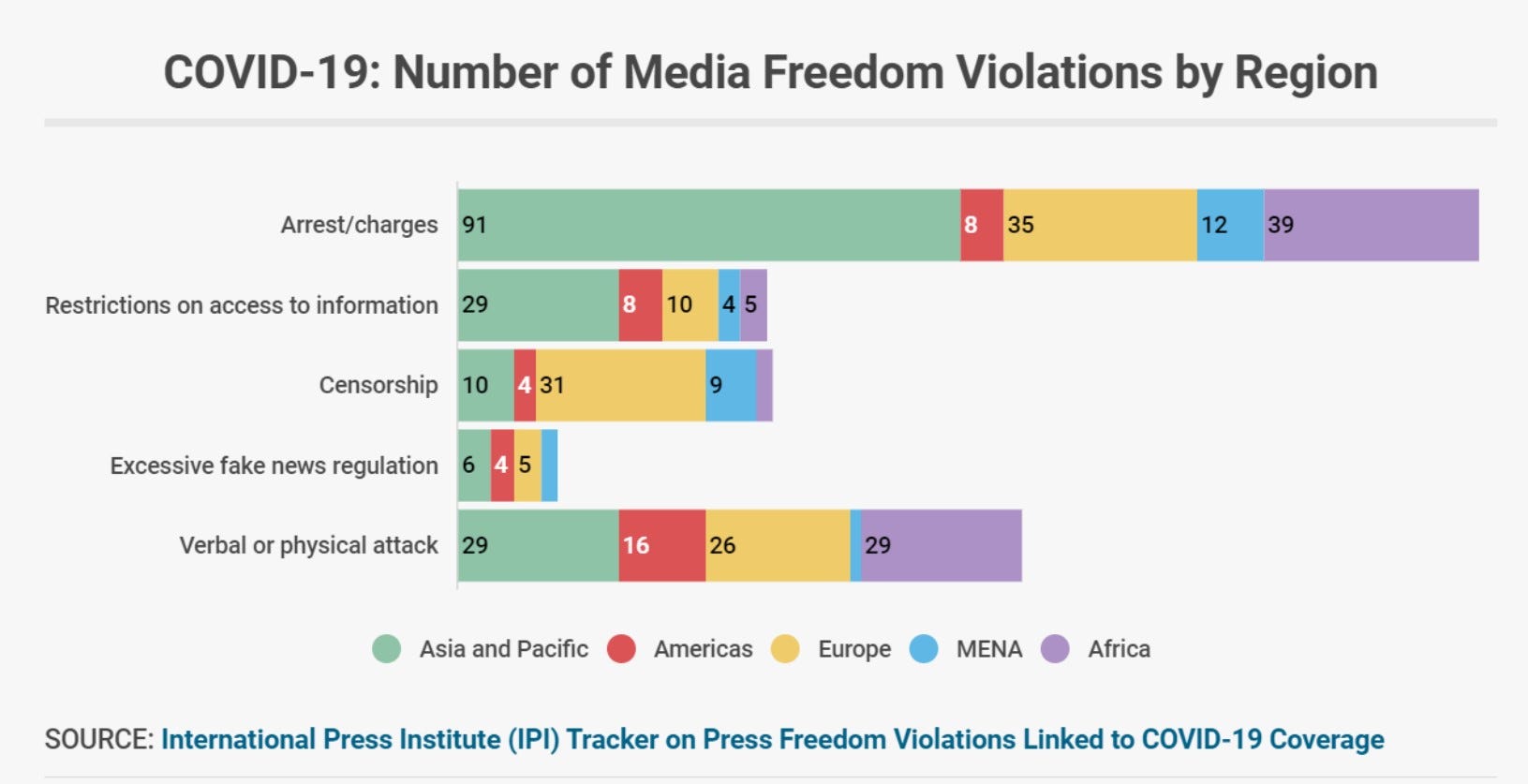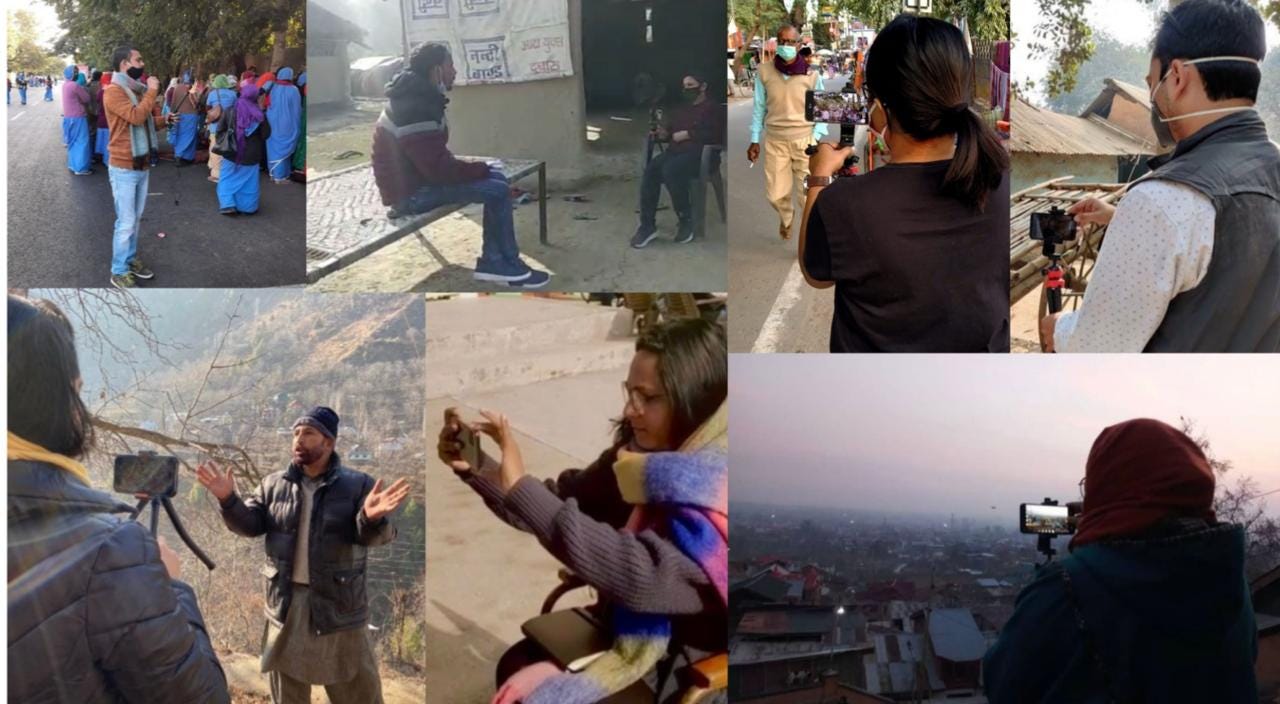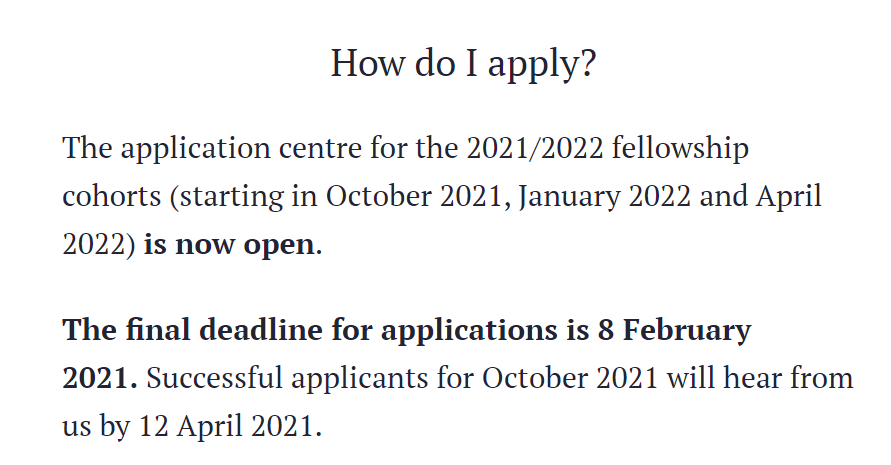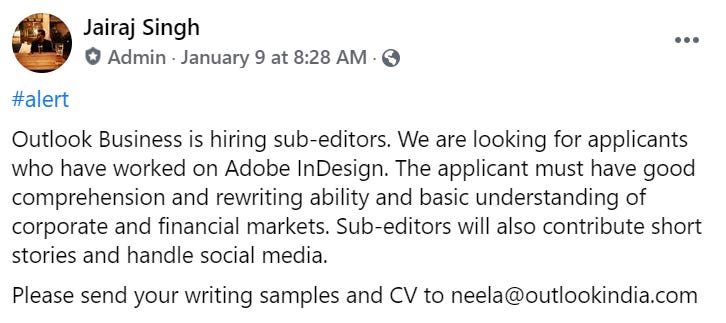The year 2020 was an unforgiving one for businesses world over. As economies plummeted, lives got ravaged and governments went into a frenzy, media took the center stage to report on everything that was happening. While newsrooms struggled to get to the source with all the restrictions, a wave of fake news arose. And if these two scenarios weren't enough to hamper the media workflow, governments and authorities came cracking down to sabotage and violate press freedom to hide its own adequacies of coping with the pandemic and to lead the public narrative in times of increasing polarisation. Freedom of press continues to be in peril.
According to the International Press Institute (IPI), that closely monitors the situation, 473 media freedom violations have been recorded globally. Arrest/charges, restriction on access to information, censorship, excessive fake news regulation, and verbal and physical attack all together amount to this number.

The situation is grim everywhere. India emerged with the highest number of violations in the Asia-Pacific region. Back in March, when the pandemic was beginning to soar in the country with its population engaged (read: distracted) in weekly activities such as clanging utensils and lighting earthen lamps, the Government of India filed a petition with the Supreme Court to ban the media from publishing any pandemic related information unless cleared by the government. The apex court stated that it did not wish to interfere with a free discussion about the pandemic but directed media to refer and publish to official sources only.
“We trust and expect that all concerned viz., state governments, public authorities and citizens of this country will faithfully comply with the directives, advisories and orders issued by the Union of India in letter and spirit in the interest of public safety,” the bench said, as reported by The Economic Times.
Barbara Trionfi, the IPI Executive Director said, "In 2020, IPI has observed unacceptable levels of attacks against independent media and journalists in India, Pakistan, Bangladesh and Nepal, a region where press freedom has already been severely curtailed in recent years.”
After the Supreme Court refused to lay down a blanket ban, a petition was filed against Siddharth Varadarajan, the Chief Editor of The Wire. A criminal case was filed for an article published in The Wire regarding Uttar Pradesh's Chief Minister's plan to hold a religious gathering, claiming that it was fake news.
At least 10 cases were filed against journalists in Himachal Pradesh for reporting on migrant workers stranded due to a sudden lockdown. Since Article 370 was revoked in Jammu & Kashmir, lack of internet has made it nearly impossible for journalists to report on the real situation in the state. And with the Ministry of Information and Broadcasting's November Gazette announcing the inclusion of online media under its own purview, the future of digital media has been pushed into uncertainty. Just scrolling through the number of statements issued by the Editors Guild of India through the year stands testament to the grave challenge that the media has faced through 2020.
On the other side of the globe, Puerto Rico filed a First Amendment (right to free speech and free press) lawsuit in May 2020 against recently enacted laws to stop the media from sharing information around the emergency, reported ACLU. President Trump also effectively used 2020 crises to further come down on the media, denying most of what it reported: pandemic, impeachment, elections, all included.
Africa faced a similar challenge too. Reporters Without Borders (RSF) has summarised the attacks and threats faced by journalists across Africa in the wake of the pandemic in this report. While some journalists faced police brutality, others had to flee to avoid the worst. RSF recorded 109 press freedom violations linked to the pandemic, 40 arbitrary arrests, 26 attacks, 14 convictions, 19 restrictive measures, and more than 10 threats in Sub-Saharan Africa.
According to the European parliament report, media in most parts of the world faced the suppression. The Russian government ordered the removal of 'fake news' regarding the country's response to the pandemic. This forced many independent media houses to take down articles if they did not want to face punitive measures. Turkey restricted social media, making arrests. Cambodia implemented an emergency law granting the government stronger control over the country's press and social media platform. Philippines, Iran, Saudi Arabia, Algeria, Egypt, Kenya, Zimbabwe...the list is endless. And how China reacted to the emergence of this virus, stifling whistleblowers and media from raising an alarm is not new to any of us. Countries ranking poorly in RSF's 2020 World Press Freedom Index have landed themselves there due to their restrictive measures and media suppression.
2021 marks the beginning of a new decade, an important one. A free and independent press is an important pillar of any democracy, and essential for the protection of human rights. Because if not for a transparent media, how will the instances of injustice be brought to public sight so appropriate redressals can be sought and governments are held accountable.

There is a constant inflow of content and queries from our fellows who are on the ground chasing stories. From a report on life in a conflict zone in Uri, to tribals in Uttarakhand fighting for basic rights, effects of farm laws on border village, and how and why are 70,000 indigenous people facing eviction in West Bengal, our social media channels stayed abuzz with behind-the-scenes and updates.
Completed stories coming soon. Stay tuned.


Fellowship Program: Rethinking Journalism by the Journalist Fellows of the Reuter Institute:

ABOUT THIS NEWSLETTER
This newsletter is an attempt to keep up and share all the latest and greatest stories in media and how they get done. Read about it here: About In Old News-Letter. And if you were forwarded this newsletter, here’s how you can sign up to get the latest editions as they come out!


